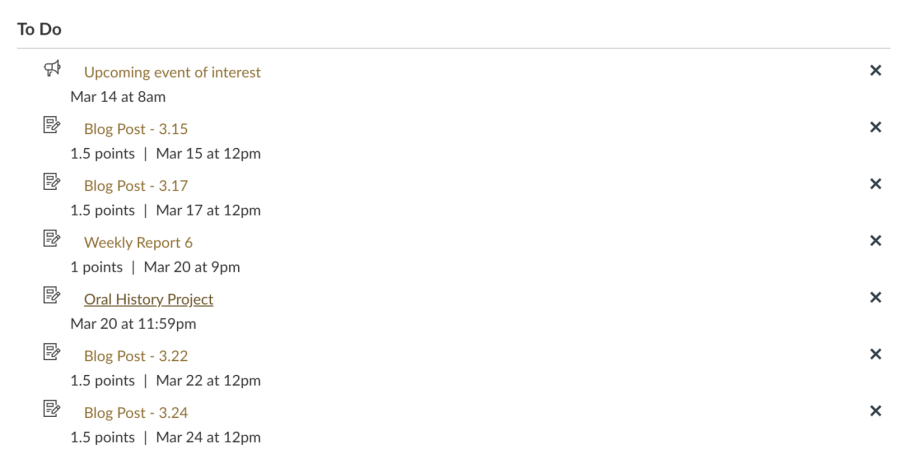Technology exacerbates college students’ anxiety
As the spring semester progresses, increasing workloads cause mental health issues among students
Technology makes being a student a 24/7 affair.
March 17, 2022
Are you stressed about something right now? Does anxiety seem to follow you around? Can you remember the last time you weren’t worried about anything at all?
If, as a college student, stress has become an unhealthy issue, you are certainly not alone. Our college years represent an important period in terms of our mental health patterns — analyses of these behaviors show that they have drastically changed for today’s students.
According to data collected by the American Addiction Center, 88% of college students experience what they describe as severe stress on a regular basis. Forty-four percent of college students experience severe anxiety. Forty-seven percent of college students screened positive for clinically significant symptoms of anxiety — which are now up from 44% last year and the highest rate since the survey began in 2007.
These statistics are jarring, and they pose a consequential question: Why are college students more anxious than ever?
College students are easy targets for anxiety because many elements of our lives are full of pivotal, stressful transitions. Anticipation anxiety, separation anxiety, social anxiety and academic anxiety are a few of the most common stressors that plague students — but these are issues that past generations have been overcoming for years.
The lifestyle change that today’s college students are faced with — as opposed to those from 15 – 20 years ago — is the newfound inclusion of technology at school. Anxiety levels in college students have skyrocketed in recent years, and this can be largely attributed to the sudden incorporation of the Internet in college life.
One night over spring break, I was out with a friend in New York City. The last thing on my mind was school, but when my phone flashed with an incoming midterm grade, I was immediately taken out of the moment and sucked into a spiral of worry. As a student, having our technology and schoolwork intertwine is extremely difficult. School follows us everywhere — there is always a grade to check or an email to respond to.
Separating school and social life is nearly impossible with constant notifications. Finding a healthy balance between focusing on school and taking a break can be extremely difficult. This direct line of communication and access to schoolwork seems like an academic advancement, but the stress that comes with constantly carrying school in your pocket makes it less appealing for students.
The internet can also be perpetually overwhelming for young people. A few days ago, I realized I had nearly twenty tabs open on my laptop. They consisted of a list of Wake Forest’s majors and minors, summer internship opportunities, careers at the New York Times, a Quizlet of Italian flashcards, my DegreeWorks page and a list of grad schools, just to name a few. It is remarkably easy to go down a spiral of preparing, planning and researching when it comes to school and career goals. I used to do this daily until I became so overwhelmed that I had to close my computer and distract my mind with anything else. The instant opportunities that the internet presents are seemingly endless and certainly overwhelming. Having a world of opportunities at our fingertips can serve as a unique system to jumpstart our careers, but more than anything, it leaves us faced with a staggering overload of information.
The internet is also painfully persistent about showing us the phenomenal things that other people our age are doing, creating a hub for comparison and competition. We see a sliver of people — specifically other young people — who have done incredible things such as discovering a new species or inventing a new medicine because this is what the Internet shows us. It is nearly impossible to stop ourselves from self-comparison.
The internet shows us the best of the best, tricking us into believing that all of our peers are superior to us. As students trying to find our place in the world, this mindset of constantly comparing ourselves to others is difficult to overcome.
These examples of how technology presents itself in our lives may not be applicable to everyone, but technology has without a doubt made our college experience different than that of generations before us. It certainly is not all about stress — the internet undeniably presents a fascinating new way to learn and prepare for life after college. But as technology has become increasingly ubiquitous, it is no overstatement to say that it has left today’s students with more qualms about schoolwork and a more anxiety-inducing college experience than ever before.
Because the internet makes several aspects of our coming-of-age experience inherently more stressful, it’s now more important than ever to move through college at your own pace, stay grounded in your surroundings and place genuine value in the work you’ve done.













